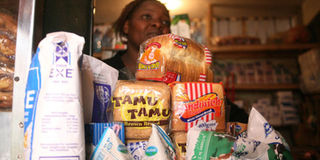Tax measures to boost growth but prices of goods will go up

Some of the basic commodities that the value added tax (VAT) bill proposes a 16% tax taken on June 13 2013. PHOTO/PHOEBE OKALL
What you need to know:
- Finance Cabinet Secretary Henry Rotich also announced he would re-introduce the controversial Value-Added Tax Bill to Parliament through which he will be seeking to impose a 16 per cent tax on basic consumer goods.
- The value of houses and cost of renting will also go up with the reintroduction of the Capital Gains Tax, which is expected to increase the cost of land transaction as investors pass on the cost to buyers.
Consumers will face high prices of basic goods and food items as the Treasury moves to raise additional revenue to finance the Jubilee Coalition’s campaign pledges, including free maternal health services and laptops for pupils.
Among the raft of infrastructure projects to be funded is the construction of a modern railway line, which is expected to be completed in the next three years.
The line will reduce travel time between Mombasa and Nairobi threefold. It is also expected to reduce the transportation of heavy goods by road, reducing the cost of transportation while easing the flow of traffic on major highways.
Finance Cabinet Secretary Henry Rotich also announced he would re-introduce the controversial Value-Added Tax Bill to Parliament through which he will be seeking to impose a 16 per cent tax on basic consumer goods.
“I will re-table the VAT Bill, which aims to simplify, modernise and reduce the cost of compliance by realigning our tax policies with the Constitution,” Mr Rotich said when he presented the Sh1.6 trillion Budget proposal for the financial year 2013/14 at Parliament Buildings Thursday.
The prices of basic goods such as milk, bread, maize and wheat flour, sanitary towels and newspapers will go up by at least 16 per cent once Parliament enacts the Bill.
The cost of farm inputs including fertilizer, livestock feeds and pesticides will also go up by the same margin, which could lead to an increase in the prices of vegetables, fruits, maize and other farm products. Mr Rotich expects to raise Sh10 billion through this tax.
The second tier of consumer goods price increases will come from the 1.5 per cent duty imposed on all imported goods. The tax is meant to raise money for the construction of a modern railway line from Mombasa to Kisumu.
Under the Jubilee manifesto, the construction of the two-track standard gauge railway line is one of the top priorities.
“When completed in three years’ time, (this project) will reduce significantly the cost of freight, thereby saving businesses huge resources,” Mr Rotich said.
However, for consumers, this will translate to more expensive goods.
The value of houses and cost of renting will also go up with the reintroduction of the Capital Gains Tax, which is expected to increase the cost of land transaction as investors pass on the cost to buyers. The tax will also affect those investing in shares and debt in the capital markets.
Promising to cast the tax collection net wider, Mr Rotich also reiterated the government’s efforts get landlords into the tax net. He called for the deployment of technology in mapping out all rental property in urban areas. Landlords have warned that this could result to high rent for consumers.
The move is likely to pile more pressure on consumers with landlords expected to pass the additional cost to tenants.
“I have once again directed KRA to leverage on technology, map out all rental property in urban areas and put in place a robust institutional framework for bringing all these landlords into our tax net by December 2013,” Mr Rotich said.
Hunt for more cash
But the Treasury’s hunt for more cash will not only be felt in the pricing of basic goods. Last year, the government introduced a 10 per cent exercise duty on the fees charged for all financial transactions.
The new tax, which became effective in February, makes it more expensive to send or receive cash on mobile money platforms such as M-Pesa, Airtel Money, yuCash and Orange money.
The review of the Excise Duty Act could reveal more taxes on these and on beer and cigarettes.
Toothpaste and cosmetic goods are also likely to cost more after Mr Rotich imposed a 10 per cent to 25 per cent duty on import of plastic tubes for packing toothpaste, cosmetics and similar products. The move will shield manufacturers from cheap imports.
In the health sector Sh3.8 billion was set aside for free maternal health and Sh700 million for free access to all health centres and dispensaries.
“I have allocated a further Sh3.1 billion and Sh522 million for recruitment of 30 community nurses and 10 community health workers, respectively per constituency to provide quality health care services to Kenyans,” Mr Rotich said.




